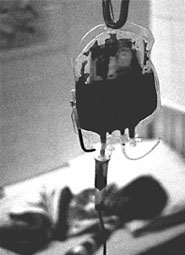Matter of blood
 the scarcity of blood throughout the world has prompted researchers to devise methods so that its use could be minimised. A team of researchers led by Lawrence Goodnough at the Washington University School of Medicine, St Louis, usa , reports that new drugs and techniques can make many transfusions unnecessary. They have developed erythropoiten therapy that eliminates the need of blood transfusion during surgeries. The method also reduces the risk of infections and other risks associated with blood transfusions ( New England Journal of Medicine , Vol 336, No 13).
the scarcity of blood throughout the world has prompted researchers to devise methods so that its use could be minimised. A team of researchers led by Lawrence Goodnough at the Washington University School of Medicine, St Louis, usa , reports that new drugs and techniques can make many transfusions unnecessary. They have developed erythropoiten therapy that eliminates the need of blood transfusion during surgeries. The method also reduces the risk of infections and other risks associated with blood transfusions ( New England Journal of Medicine , Vol 336, No 13).
Erythropoiten is a human hormone that boosts the production of red blood cells in the body. A patient who is required to undergo an elective surgery, is given six shots of erythropoiten few weeks before the surgery. During this period, he generates about one litre (two pints) of blood. Even after losing nearly two to three pints of blood during the surgery, the patient's body contains enough red cells, thus ruling out the need for transfusion of blood.
Goodnough and his team performed the erythropoiten therapy on some patients and conducted surgeries without external infusion of blood. After the surgery, the patients felt better and had higher red cell counts than those who received blood transfusions. Inspired by the success, the researchers conducted clinical trials for erythropoiten on other patients reporting for prostrate surgery. Out of 24 patients on whom the tests were conducted, only one required a pint of additional blood. All other patients were found to have high red cells counts after the surgery.
The therapy is prescribed to mildly anaemic patients who need to undergo a major surgery. Anaemic patients contain a reduced number of red blood cells. Most of these patients require blood transfusions. They need the medication at least two weeks before the operation. The only limitation of the therapy is that the procedure is only applicable to elective surgeries, which can be planned in advance. It cannot be performed on patients who have to undergo emergency operations.
The researchers are now making attempts to improve the procedure. For instance, the erythropoiten therapy is expensive and costs nearly three times the money needed for blood transfusions. T G Monk, a colleague of Goodnough, is conducting clinical trials with lower doses of the medication as well as attempting to combine it with other methods. He has already succeeded in bringing down the required quantity of medicine to half.
Some other research groups are testing different methods of
Related Content
- Order of the National Green Tribunal regarding microplastics, 01/03/2023
- Order of the National Green Tribunal regarding biomedical waste management, 19/03/2021
- Report on management of bio-medical waste, Uttar Pradesh, 24/07/2020
- Order of the National Green Tribunal regarding unregulated slaughter of pigs in Delhi, 08/08/2019
- Order of the National Green Tribunal regarding unscientific carcass disposal site at Village Ladhowal, District Ludhiana, Punjab, 24/05/2019
- Residents hope for strict action on noise pollution
